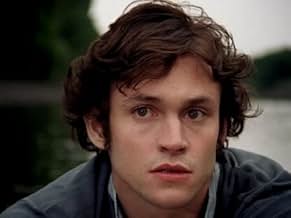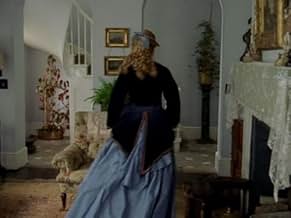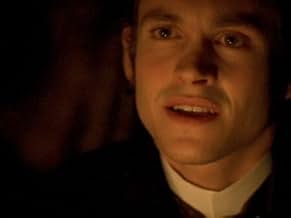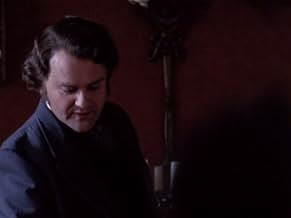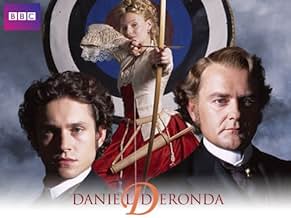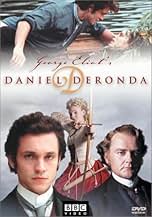Daniel Deronda
- TV Mini Series
- 2002
- 53m
Set in Victorian London, Gwendolen Harleth is drawn to Daniel Deronda, a selfless and intelligent gentleman of unknown parentage, but her own desperate need for financial security may destro... Read allSet in Victorian London, Gwendolen Harleth is drawn to Daniel Deronda, a selfless and intelligent gentleman of unknown parentage, but her own desperate need for financial security may destroy her chance at happiness.Set in Victorian London, Gwendolen Harleth is drawn to Daniel Deronda, a selfless and intelligent gentleman of unknown parentage, but her own desperate need for financial security may destroy her chance at happiness.
- Won 3 BAFTA Awards
- 5 wins & 4 nominations total
Browse episodes
Featured reviews
George Eliot was a truly excellent writer, but 'Daniel Deronda' was perhaps not her best work. This may go some way to mitigating the rather average results that emerge from this adaptation. Intended to be an insightful and complex tale of love, greed, selfishness, prejudice, maturity, and self-knowledge, the film (like the novel) proceeds more like two almost-unconnected stories, neither of which is wildly interesting.
Tying the two plots together is Daniel Deronda, played by Hugh Dancy. Dancy walks his way through, somehow making most of his lines seem redundant. To be fair, acting out a novel that uses extensive narration and introspection can't be easy, but a more experienced actor might have been a better choice to tackle such a tough job. The character of Daniel is a young man on the path of self-discovery, with detours along the way for a bit of romance and a little aimlessness. His relationships with two women form the fabric of the story.
The first tale revolves around the young, pretty, and petty Gwendolen Harleth. Played well, if not spectacularly, by the radiant Romola Garai, she is impetuous and selfish (though usually without intent), thinking that she is and must be the centre of attention. Garai plays her as someone who thinks that she has mastered the world around her, but is in fact nothing more than an indulged child. When her family is virtually ruined financially, she must choose between making a loveless marriage to maintain her high living, or quiet penury in the country. Naturally, she chooses the former. However, what she does not realise is that her suitor, Henleigh Grandcourt, is actually a cold, calculating sadist whose only interest in her is as an item of torment. Grandcourt is played by Hugh Bonneville, the one real stand-out in the production. Bonneville delivers an excellent performance as the deceptive, thoroughly wicked abuser. His Grandcourt is a flint-hearted reptile who first tricks Gwendolen with false kindness and then, when he has her in his grasp, begins to crush her with his cruelty.
Plot two centres on Daniel's relationship with Mirah Lapidoth, a Jewish singer whom he saves from a suicide attempt. Mirah is played by Jodhi May, who is actually rather flat in her delivery. May seems to go in for the "hushed whisper" technique quiet a bit. I suspect the idea was to portray Mirah as a sensitive, troubled woman, but in the end she just seems dull and high-strung. Her search for (and eventual reunion with) her family draws Daniel down a path that he would probably not otherwise have visited, and it has a significant impact on his life.
Good supporting work shores things up a bit, though the screen time is limited. The first comes from Edward Fox as Sir Hugo, Daniel's benefactor, a kindly old man of great wealth who acts as a sort of father to him. The always-excellent Greta Scacchi, looking strikingly haggard in character, is a ghost from Grandcourt's past who comes back to haunt his new bride.
I rate it 6/10.
Tying the two plots together is Daniel Deronda, played by Hugh Dancy. Dancy walks his way through, somehow making most of his lines seem redundant. To be fair, acting out a novel that uses extensive narration and introspection can't be easy, but a more experienced actor might have been a better choice to tackle such a tough job. The character of Daniel is a young man on the path of self-discovery, with detours along the way for a bit of romance and a little aimlessness. His relationships with two women form the fabric of the story.
The first tale revolves around the young, pretty, and petty Gwendolen Harleth. Played well, if not spectacularly, by the radiant Romola Garai, she is impetuous and selfish (though usually without intent), thinking that she is and must be the centre of attention. Garai plays her as someone who thinks that she has mastered the world around her, but is in fact nothing more than an indulged child. When her family is virtually ruined financially, she must choose between making a loveless marriage to maintain her high living, or quiet penury in the country. Naturally, she chooses the former. However, what she does not realise is that her suitor, Henleigh Grandcourt, is actually a cold, calculating sadist whose only interest in her is as an item of torment. Grandcourt is played by Hugh Bonneville, the one real stand-out in the production. Bonneville delivers an excellent performance as the deceptive, thoroughly wicked abuser. His Grandcourt is a flint-hearted reptile who first tricks Gwendolen with false kindness and then, when he has her in his grasp, begins to crush her with his cruelty.
Plot two centres on Daniel's relationship with Mirah Lapidoth, a Jewish singer whom he saves from a suicide attempt. Mirah is played by Jodhi May, who is actually rather flat in her delivery. May seems to go in for the "hushed whisper" technique quiet a bit. I suspect the idea was to portray Mirah as a sensitive, troubled woman, but in the end she just seems dull and high-strung. Her search for (and eventual reunion with) her family draws Daniel down a path that he would probably not otherwise have visited, and it has a significant impact on his life.
Good supporting work shores things up a bit, though the screen time is limited. The first comes from Edward Fox as Sir Hugo, Daniel's benefactor, a kindly old man of great wealth who acts as a sort of father to him. The always-excellent Greta Scacchi, looking strikingly haggard in character, is a ghost from Grandcourt's past who comes back to haunt his new bride.
I rate it 6/10.
Mary Anne Evans finished writing "Daniel Deronda" in 1876. It was the last of several novels she wrote under the pen name, George Eliot. She was 57 at the time and would live but four more years. Among more than 40 fiction writers of the period, Eliot was one of the great chroniclers of 19th century English society (Georgian-Victorian).
"Deronda" is also the last of Eliot's books to be scripted for a movie. This rendition by the BBC in three parts is excellent. For the fairly recent filming - 2002, the film makers were able to capture the England of the 1870s very well. The cinematography was excellent, as were the script and direction. The acting was first-rate by the entire cast. As some others have mentioned, Hugh Bonneville excelled in his role of a shrewd, mean, heartless "villain," under the guise of a calm, but indifferent gentleman. Romola Garai and Jodhi May were perfect in their roles, and Hugh Dancy was superb in his slight reserve and humility, matching the character in the book. Edward Fox was on the mark in his supporting role, and all the rest of the cast were terrific.
My rating is down one point from a 10 only because of the slight disjointedness in the film. Others have commented on the appearance of two films together, and the difficulty of interweaving them. It wasn't a distraction, but it was noticeable - as though the script should have given us smoother connections between stories. But this is a tremendous film and most enjoyable foray into Victorian England.
I have to give Eliot kudos for one more thing that no one else seemed to comment on. That was the dialog around the table during the Jewish meal. Mordecai said that the Jews would not reach an end to their low esteem until they had a land of their own - in the eastern Mediterranean. What great foresight by a writer 75 years before the worldwide emigration of Jews to the Holy Land after World War II, and the establishment of modern Israel in the late 1940s.
I compliment the BBC for putting Eliot's great books on film, starting in the 1990s. Anglophiles and all of us who enjoy great movies and stories, will cherish these films for years to come. They are a great way to expose the young generation of today with some of the great literature and history of 19th century England.
The world would indeed have loved to have more of Eliot, Charles Dickens, Charlotte Bronte, Jane Austen, Anthony Trollope and Lewis Carroll (Charles Dodgson). Most of them lived a little to a lot longer than the average age of life expectancy at the time. In 1850, that was 40 for males and 42 for females. Trollope (1815-1882) lived to be 67. Eliot (1819-1880) lived to be 61. And Carroll (1822-1898) was 66 when he died. Dickens also beat the average age of death, living to 58 from 1812-1870. But Austen (1775-1817) and Bronte (1816-1855), lived to only 42 and 39, respectively.
"Deronda" is also the last of Eliot's books to be scripted for a movie. This rendition by the BBC in three parts is excellent. For the fairly recent filming - 2002, the film makers were able to capture the England of the 1870s very well. The cinematography was excellent, as were the script and direction. The acting was first-rate by the entire cast. As some others have mentioned, Hugh Bonneville excelled in his role of a shrewd, mean, heartless "villain," under the guise of a calm, but indifferent gentleman. Romola Garai and Jodhi May were perfect in their roles, and Hugh Dancy was superb in his slight reserve and humility, matching the character in the book. Edward Fox was on the mark in his supporting role, and all the rest of the cast were terrific.
My rating is down one point from a 10 only because of the slight disjointedness in the film. Others have commented on the appearance of two films together, and the difficulty of interweaving them. It wasn't a distraction, but it was noticeable - as though the script should have given us smoother connections between stories. But this is a tremendous film and most enjoyable foray into Victorian England.
I have to give Eliot kudos for one more thing that no one else seemed to comment on. That was the dialog around the table during the Jewish meal. Mordecai said that the Jews would not reach an end to their low esteem until they had a land of their own - in the eastern Mediterranean. What great foresight by a writer 75 years before the worldwide emigration of Jews to the Holy Land after World War II, and the establishment of modern Israel in the late 1940s.
I compliment the BBC for putting Eliot's great books on film, starting in the 1990s. Anglophiles and all of us who enjoy great movies and stories, will cherish these films for years to come. They are a great way to expose the young generation of today with some of the great literature and history of 19th century England.
The world would indeed have loved to have more of Eliot, Charles Dickens, Charlotte Bronte, Jane Austen, Anthony Trollope and Lewis Carroll (Charles Dodgson). Most of them lived a little to a lot longer than the average age of life expectancy at the time. In 1850, that was 40 for males and 42 for females. Trollope (1815-1882) lived to be 67. Eliot (1819-1880) lived to be 61. And Carroll (1822-1898) was 66 when he died. Dickens also beat the average age of death, living to 58 from 1812-1870. But Austen (1775-1817) and Bronte (1816-1855), lived to only 42 and 39, respectively.
I'm watching the British series Daniel Deronda every week on Swedish tv, and I will recommned it to everyone who fancies quality literary adaptations. The production values are impeccable, and the acting list very impressive. The one to catch your attention, though, is without a doubt Hugh Bonneville as the supervillain Grandcourt. He's everything a good oldfashioned villain from the 19.th century ought to be: suave, cool, arrogant, manipulative, morally corrupt, and with a razor sharp wit. In fact, he totally overshadows the meek and handsome, but oh so noble and earnest hero, poor Daniel Deronda! Hugh Dancy does his best, but it's hard work to make Deronda as interesting as Grandcourt! Likewise with the heroine. Romola Garai is beautiful to look at, but it's difficult to really care about Gwendolyn. She's such a silly, whiny, and cold person who would rather marry a man she dislikes than stoop to be a governess! It made me long to give her a good whipping! All in all, I think she and Deronda deserve each other, for being so awfully colourless and boring. I'd much rather spend the time watching the villain smirk, or wonder about miss Lapidoth's strange fate, among the Jews. As usual, being the villain pays off! Hugh Bonneville and David Bamber as Lush are the characters you remember! They really are perfectly selfish and dastardly mean!
If you're familiar with George Eliot and have read her books, you'll most likely enjoy this adaptation.
But if you're a George Eliot purist, you may be dismayed by the film's romanticization of Daniel & Gwendolyn's relationship. I personally was okay with it and found it a forgivable artistic liberty, as it was handled delicately and tastefully and did not detract from the heart of the story. In fact, I liked the adapted screenplay for its restraint.
If you're a Jane Austen fan but not familiar with Eliot's work, you might find this story lacking in wit compared to Austen's stories, or just too glum. But George Eliot herself was a very different woman from Austen. The Jewish subplot--something that is also present in Eliot's more famous 'Middlemarch'--is enough to make the two authors different, but the sociopolitical depth and soberness of Eliot's work also sets them apart.
The casting was terrific all around (including the magnificently aging Greta Scacchi), and the costumes & scenery were perfect.
~NN
But if you're a George Eliot purist, you may be dismayed by the film's romanticization of Daniel & Gwendolyn's relationship. I personally was okay with it and found it a forgivable artistic liberty, as it was handled delicately and tastefully and did not detract from the heart of the story. In fact, I liked the adapted screenplay for its restraint.
If you're a Jane Austen fan but not familiar with Eliot's work, you might find this story lacking in wit compared to Austen's stories, or just too glum. But George Eliot herself was a very different woman from Austen. The Jewish subplot--something that is also present in Eliot's more famous 'Middlemarch'--is enough to make the two authors different, but the sociopolitical depth and soberness of Eliot's work also sets them apart.
The casting was terrific all around (including the magnificently aging Greta Scacchi), and the costumes & scenery were perfect.
~NN
This was one of the more exquisite costume drama adaptations I have seen, with attention to detail absolutely striking in an archery scene that sets the bar for the entire series. Like the novel, it is polarizing in its two stories in one - people seem to either love/hate Daniel's plight or love/hate Gwendolyn's.
Personally, I found Gwendolyn equally annoying in both novel and film. Hugh Darcy, as the eponymous hero, was pretty to look at and delivers a fine, if unremarkable, performance.
But it is Hugh Bonneville as the dastardly Henleigh Grandcourt who took my breath away! He is flawlessly reprehensible, stealing every scene he was in and when he wasn't in a scene, I couldn't wait to see him again! It was terrific seeing Hugh Bonneville in such a role, as he's usually cast in the "very nice guy" roles (Bridget Jones Diary, Iris, Tipping the Velvet, etc). Although he's fine in such roles, as Grandcourt he made my skin crawl with his morally bankrupt, wealthy and pugnacious swagger. LOVED him!
What this series could have used more of was Jodhi May and Greta Scacchi. In difficult supporting roles, both women shine as, respectively, a searching, haunted Jewess and a scorned, bitter mistress. Barbara Hershey makes an appearance late in the series in a pivotal plot device that I won't reveal lest some unsuspecting viewer be bitter with me, and in a limited role gives a performance that reminds us why she became famous in the first place (and at least for this viewer, made me forgive her 'Beaches').
Overall, this adaptation is very enjoyable and recommended viewing for fans of the genre.
Personally, I found Gwendolyn equally annoying in both novel and film. Hugh Darcy, as the eponymous hero, was pretty to look at and delivers a fine, if unremarkable, performance.
But it is Hugh Bonneville as the dastardly Henleigh Grandcourt who took my breath away! He is flawlessly reprehensible, stealing every scene he was in and when he wasn't in a scene, I couldn't wait to see him again! It was terrific seeing Hugh Bonneville in such a role, as he's usually cast in the "very nice guy" roles (Bridget Jones Diary, Iris, Tipping the Velvet, etc). Although he's fine in such roles, as Grandcourt he made my skin crawl with his morally bankrupt, wealthy and pugnacious swagger. LOVED him!
What this series could have used more of was Jodhi May and Greta Scacchi. In difficult supporting roles, both women shine as, respectively, a searching, haunted Jewess and a scorned, bitter mistress. Barbara Hershey makes an appearance late in the series in a pivotal plot device that I won't reveal lest some unsuspecting viewer be bitter with me, and in a limited role gives a performance that reminds us why she became famous in the first place (and at least for this viewer, made me forgive her 'Beaches').
Overall, this adaptation is very enjoyable and recommended viewing for fans of the genre.
Did you know
- TriviaThe novel is set in the early 1860s, whereas the adaptation moves the action ahead to 1874, the year that George Eliot began writing the novel.
- GoofsAt Ezra Cohen's store, the baby's left shoe and sock disappear then reappear.
- ConnectionsFeatured in George Eliot: A Scandalous Life (2002)
- How many seasons does Daniel Deronda have?Powered by Alexa
Details
- Release date
- Countries of origin
- Official sites
- Language
- Also known as
- 丹尼爾的半生緣
- Filming locations
- Edinburgh, Scotland, UK(Jewish market scenes)
- Production companies
- See more company credits at IMDbPro
Contribute to this page
Suggest an edit or add missing content


